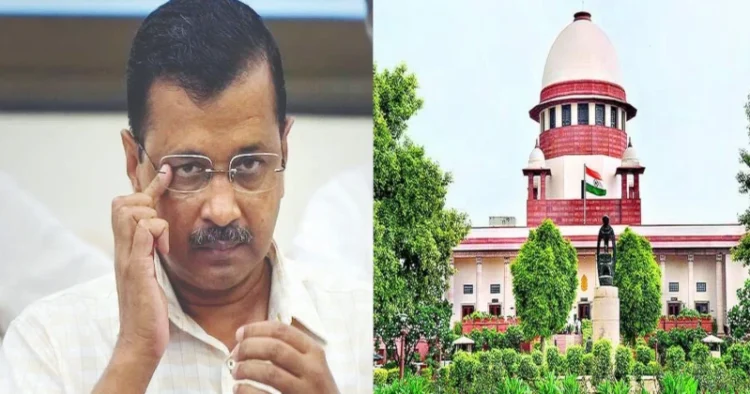The Supreme Court on May 7, addressed the ongoing legal battle surrounding Delhi Chief Minister Arvind Kejriwal’s arrest in connection with a money laundering case linked to the Delhi liquor policy. During the hearing, the court expressed concerns about granting interim bail to Kejriwal, stating that it didn’t want him to perform official duties if released temporarily, fearing it could lead to conflicts. The court emphasised the need to maintain the integrity of government operations and stressed that elections were the only reason for considering interim relief.
Kejriwal’s lawyer, Abhishek Manu Singhvi, representing the Aam Aadmi Party (AAP) supremo, assured the court that Kejriwal would not engage in excise case-related matters if granted interim bail, reiterating his role as the sitting Chief Minister. However, the court remained cautious, citing the potential implications of allowing Kejriwal to perform official duties while on bail.
If we give interim #bail to #ArvindKejriwal, we don't want him to be performing official duties as somewhere it will lead to conflict
We do not want interference at all in the working of the government
If elections were not there then it would not have given… pic.twitter.com/2C9Y6qXYqy
— Organiser Weekly (@eOrganiser) May 7, 2024
The court also questioned the Enforcement Directorate (ED) about the prolonged investigation into the money laundering case, specifically focusing on the timing and handling of the probe. The Additional Solicitor General S V Raju, representing the ED, clarified that Kejriwal’s involvement emerged at a later stage of the investigation, and detailed the allegations against him, including purportedly staying at a luxury hotel during the 2022 Goa Assembly polls, with expenses allegedly covered by the Delhi government’s administration department.
Kejriwal’s arrest on March 21 and subsequent judicial custody in Tihar jail prompted his plea for interim bail, citing alleged procedural irregularities and motivated arrests. The court’s scrutiny underscores the need for expeditious yet thorough investigations, ensuring fairness and adherence to legal procedures.
The Supreme Court’s decision to consider interim bail reflects the unique circumstances of Kejriwal’s case, particularly his position as the elected Chief Minister of Delhi. The court’s cautious approach seeks to balance legal considerations with electoral dynamics, given the upcoming Lok Sabha elections in Delhi.
However, the ED’s opposition to interim bail underscores broader questions about the treatment of politicians facing legal scrutiny and the potential impact on governance and electoral processes. The court’s directive to present case files before and after Kejriwal’s arrest underscores the importance of transparency and accountability in the investigative process.
Kejriwal’s legal battle highlights broader concerns about political accountability, judicial independence, and the rule of law. As the case unfolds, it raises fundamental questions about the interface between law, politics, and governance in India’s democratic framework.
The Supreme Court’s deliberations on Kejriwal’s plea for interim bail are indicative of the complexities surrounding legal proceedings involving high-profile political figures. The court’s careful consideration of legal arguments and electoral implications underscores its commitment to upholding the rule of law while ensuring fairness and justice in the face of competing interests and pressures.
In light of the ongoing legal proceedings, Kejriwal’s arrest and subsequent plea for interim bail have generated significant public and political attention, highlighting broader debates about accountability, transparency, and the integrity of India’s democratic institutions. As the case continues to unfold, it will undoubtedly shape perceptions of governance, law enforcement, and political conduct in the country.
Overall, the Supreme Court’s handling of Kejriwal’s case underscores the importance of judicial independence, constitutional principles, and the rule of law in ensuring accountability and fairness in India’s democratic system. As the legal battle unfolds, it remains to be seen how the court’s decisions will impact the political landscape and governance dynamics in the country.




















Comments